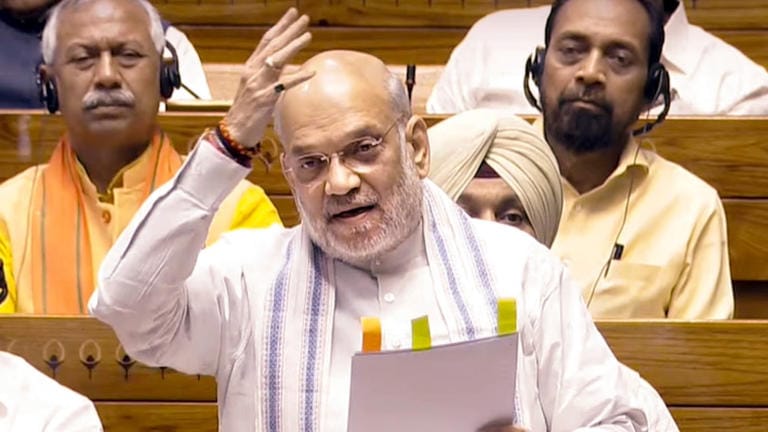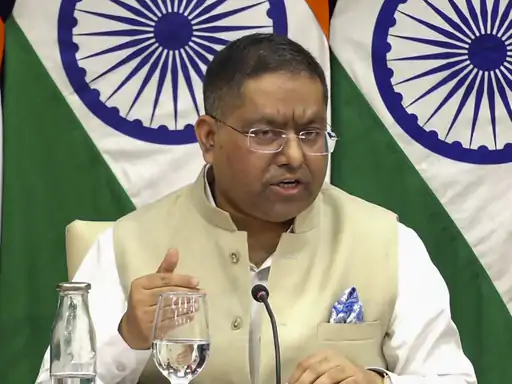In a powerful and emotionally charged speech in the Rajya Sabha, Union Home Minister Amit Shah made headlines when he firmly declared, “I am proud to say that no Hindu can ever be a terrorist.” This statement wasn’t made in isolation—it came amid a fierce debate where Shah launched a pointed attack on the Congress party, accusing it of maligning the image of Hindus by popularizing the idea of ‘saffron terror’ during its time in power.
This moment is more than just a political exchange; it represents a larger ideological battle over how terrorism, religion, and political narratives have been used—and misused—over the years in India.
Understanding “Saffron Terror”
To grasp the gravity of Shah’s statement, we must first understand what “saffron terror” means. The term was coined during the UPA regime to describe a series of terror attacks where individuals associated with Hindu nationalist groups were accused. The phrase directly linked “saffron”, a color deeply associated with Hinduism and Hindu pride, to acts of terror—suggesting a form of violent extremism from within the Hindu community.
Shah categorically rejected this framing, calling it a fabricated narrative created by Congress for political advantage. According to him, the idea of saffron terror was never rooted in truth, but rather, was a deliberate political tool designed to discredit Hindutva-based ideologies and polarize voters.
Sharp Allegations Against Congress
Amit Shah didn’t hold back in his critique of the Congress party. He accused the previous governments of going out of their way to blame Hindus and Hindutva-aligned groups in serious terror incidents like the 2008 Malegaon blasts and even the 26/11 Mumbai terror attacks, which were actually carried out by terrorists from across the border in Pakistan.
He alleged that Congress leaders promoted a false narrative for vote bank politics—choosing to target Hindus for political convenience, even if it meant weakening India’s internal unity and distracting from the real threats to national security. Shah called out Digvijaya Singh by name, claiming he was among the leaders who actively pushed this saffron terror theory, and tried to equate patriotism with extremism.
The Human Cost: Wrongful Arrests and Damaged Reputations
One of the most serious charges Shah leveled was about the wrongful arrests and torture of innocent individuals. He said that the baseless narrative of Hindu terror led to false investigations, where people were detained, defamed, and harassed simply because of their association with Hindutva organizations.
He warned that this politicization of law enforcement is not just unethical—it’s dangerous. When national agencies are used to settle political scores or appease voter bases, it erodes public trust in justice and weakens the country’s fight against actual enemies.
Revisiting Malegaon and Other Cases
The Malegaon blast case, one of the most controversial in recent history, is still under judicial process. Several of the accused were linked to the Abhinav Bharat group, often labeled as a Hindu nationalist outfit. Shah argued that the way this case was handled—where the narrative was shaped even before evidence was fully evaluated—exemplifies how politics overtook justice.
Shah contrasted these past actions with the current government’s approach, citing Operation Sindoor and Operation Mahadev, which are aimed at uncovering and dismantling anti-national networks. According to Shah, these operations are neutral and focused on national interest, not religious identity.
Jammu & Kashmir: From Fear to Peace?
Amit Shah also took the opportunity to highlight the changing dynamics in Jammu & Kashmir. He claimed that in the past six months, not a single local youth has joined terrorist outfits—a striking claim that, if accurate, points to a major turnaround in the region.
He attributed this shift to improved law and order, effective governance, and the removal of Article 370, which he said removed the constitutional cover for separatist elements. According to Shah, the recently held elections in J&K were proof of this change—polling officials were finally focused on conducting a fair democratic process, not on managing fear and threats.
A Message to Pakistan: No Dialogue Amid Terror
Shah also used his speech to send a clear and tough message to Pakistan. He said that India will not engage in any peace talks until terrorism ends. He underlined that ceasefires at the border happen only when Pakistan requests it, not because India bows to pressure.
This statement reinforces the current government’s zero-tolerance stance on cross-border terrorism, asserting that national security cannot be compromised for the sake of diplomacy.
Final Thoughts: Rewriting the Narrative
Amit Shah’s speech was a potent blend of emotion, politics, and ideology. By asserting that “no Hindu can ever be a terrorist”, he wasn’t just defending a religious community—he was trying to rewrite a controversial chapter of modern Indian politics.
Here’s what he clearly laid out:
- Hindus should never be linked with terrorism, as it insults the culture of peace they represent.
- Congress created and promoted the myth of saffron terror, damaging the nation’s unity.
- Real enemies were ignored while innocent people were harassed due to vote bank politics.
- Security in Kashmir has improved, with youth turning away from extremism.
- India won’t compromise with Pakistan until terrorism is completely uprooted.
Whether one agrees or not, it’s undeniable that Amit Shah’s remarks have sparked intense debate across political circles, newsrooms, and social media platforms. It’s a speech that will be dissected for days to come—because it goes to the heart of how India defines terrorism, nationalism, and the identity of its majority.



